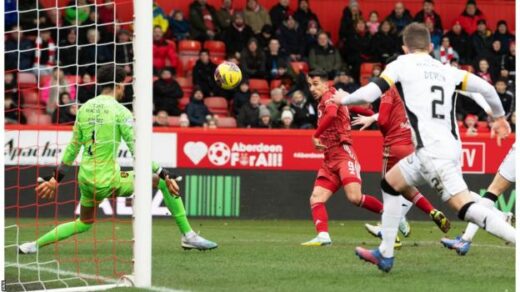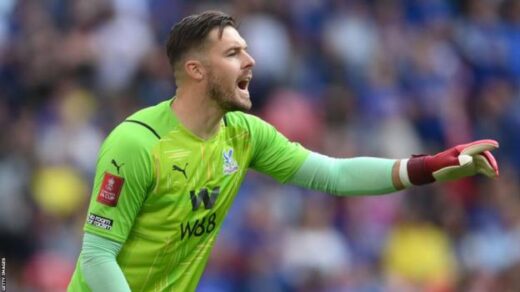ST. LOUIS — As the St. Louis City SC supporters rounded the corner, a club employee tried to keep the ever-growing mass of people in their designated area. The march to the match was to take place on sidewalks, not the street.
He had no chance.
Saturday night, the streets of St. Louis belonged to the supporters. At each block, the numbers of fans singing and chanting only grew until the city block could no longer contain them all. By the end, even the security worker just gave in. “Let ’em hear you!” he yelled as group members finally reached the destination, preparing to enter the gleaming new CityPark for the first MLS match there.
And they did. After all, some of these fans had been waiting decades for this moment, while cheering teams in lower leagues or indoor. Others have heard story after story of the half-dozen players from “the Lou” who helped the U.S. beat England in the 1950 World Cup or the teams of the St. Louis Soccer League taking all comers in the late 1910s in what would become the U.S. Open Cup.
– Stream on ESPN+: LaLiga, Bundesliga, more (U.S.)
St. Louis has always been a soccer city. Now it’s an MLS city, too.
Whether ancient or modern, St. Louis may have the most storied soccer history of any city in the country. The list of current and former U.S. internationals is long, ranging from active standouts like U.S. men’s defender Tim Ream, U.S. women’s defender Becky Sauerbrunn and men’s forward Josh Sargent to that 1950 team.
“When I would describe my soccer experience, no one else would have that,” said Taylor Twellman, a St. Louis native and former U.S. international who now works on Apple’s MLS broadcasts. “I’m asked all the time how to describe St. Louis players, and the one word I come back to, both on the men’s and women’s side, is ‘competitive.'”
That competitive nature extends to other sports as well. Twellman pointed to Ryan Howard, the former Philadelphia Phillies star whom Twellman played baseball against as a kid up before focusing on soccer, and basketball stars like Jayson Tatum and Bradley Beal, but said even they would admit St. Louis is a soccer city. Such are the numbers of players who have come through esteemed academy programs such as St. Louis Scott Gallagher or who played at the high schools and colleges such as St. Louis University in front of big crowds.
Vibrant atmosphere and some big numbers as the march grew and grew with more groups meeting up. They are AMPED for MLS in St. Louis. pic.twitter.com/Wx7KJlgrc5
— Jon Arnold (@ArnoldcommaJon) March 5, 2023
“Going to SLU, it was a lot of fun for me,” remembers Vedad Ibišević, an ex-Bundesliga standout now coaching with Hertha Berlin and a veteran of Bosnia and Herzegovina’s 2014 World Cup team. “There were big crowds back in the day.”
Ibišević moved to St. Louis as a teenager, with his family joining the largest Bosnian population outside of the country. The wave of migration started in the 1990s thanks to the city’s acceptance of refugees during the Bosnian War. There are marks of Bosnian culture everywhere, including a replica of Sarajevo’s Sebilj fountain and a number of bakeries and cafes.
Like when the St. Louis Soccer League started in 1915, European immigrants have folded into the fabric of the city’s soccer quilt to make it strong.
For years, Matt Baker remembers being asked why the city didn’t have an MLS team, and he followed efforts to bring a squad since around 2007. Now, his Flyover Footy podcast has a pro team to cover and, in a sign of the momentum behind the club, it was recently picked up by a local talk radio station. “It just really seems like this club is now taking its spot as that combination almost of all the soccer history that our city has built, but it’s also kind of taking its spot alongside the Cardinals and the Blues as a an equal in the pro landscape,” Baker said.
It doesn’t hurt either that MLS is arriving while wounds of the Rams’ abrupt departure — one that requited owner Stan Kroenke to convince his fellow NFL owners that St. Louis was no longer a viable market — are still healing. Kroenke’s arguments against the city have not been forgotten here — a local sports anchor shows highlights on his Sunday show when the team, now in Los Angeles, loses — and Kroenke’s name is still on the lips of a fair few sports fans around town.
“The Rams leaving was the lowest of the low from a civic pride perspective,” Baker said. “You didn’t just have a sports team leaving — you had the owner of the sports team, who was Missouri born-and-bred, tearing the city apart on his way out.”
New and unabashedly proud to be in St. Louis, City is a hot ticket. It has won over far more than just those who supported teams like AC St. Louis, Saint Louis Football Club or those who went to City 2 games last season.
Even those teams were taking the field more than a century after some of St. Louis’s first matches. The first organized game to make the papers in the city, at least that historian Dave Lange has record of, may have been played on an ice rink. The newspaper clip, from 1872, doesn’t make it entirely clear. Ten years after, 2,000 people enjoyed a game at legendary baseball stadium Sportsman’s Park.
The new home of St. Louis soccer is much more purpose built. In addition to a downtown location near the revitalized Union Station, CityPark has all the typical modern amenities.
It is built into the ground in part to allow each of the 22,423 seats to be as close to the field as possible. It also has more than 20 local food options for fans to munch on or drink, curated by local chef Gerard Craft, who’s won a prestigious James Beard Award. There’s toasted ravioli from a spot on the Hill, Bosnian dishes, a beloved local hot dog, Vietnamese and Mexican street food offerings, a St. Louis-style barbecue spot and, yes, a local pizza place, but one that eschews the Provel cheese mix used by many spots around town.
Patrick Kavanagh is a real estate broker in St. Louis. He’s also a die-hard Arsenal fan who fell in love with the team by watching Thierry Henry. MLS never has resonated with him, and he said he’s “a little worried about” fans sticking with the new team in STL considering that MLS isn’t the world’s top league and many fans of European soccer still look down on it. Yet, even if he’s a bit skeptical, Kavanagh joked that after watching Arsenal’s match Saturday that he’d need to “switch jerseys” and join the crowd pre-gaming near the stadium to gear up for the home opener.
“I watched the first game, and I was really impressed with the quality,” he said. “It’s definitely attracting the people that maybe were still on the fringes of the sport before, for sure.”
As every sports fan knows, there’s no better way to draw more fans to the stadium than building a winner. The club wants to do that, while also representing the city in the way that it approaches the sport.
“I’ve only been in St. Louis for two years, but it’s a hard-working, blue-collar city. That’s the type of playing style we want to have,” center-back Kyle Hiebert said. “We’re high pressure, looking to always outwork our opponent. Hopefully we’ll not only be getting results and wins, but that our style of play will suit the fans.”
The club also is already at work trying to forge an even bigger pro pathway for the talented young players in the area, with the goal of extending the list of great players to come from St. Louis even longer. That pipeline is already bearing fruit with Miguel Perez, a 17-year-old attacker who was St. Louis’s first homegrown player, making his MLS debut in St. Louis’s opening-week win over Austin FC.
“I’m sure in the future we’ll have great kids coming out of there,” Ibišević said. “I witnessed it myself. In St. Louis, there are a lot of talented kids. Now they don’t have to go to Kansas City or Chicago.”
Saturday was a dream night for soccer fans in St. Louis. The stadium was sold out, with a great atmosphere in and around the facility. City won 3-1, their second-straight win despite many projections the club would struggle out of the gate.
Clearly, the team can provide a nice night out for sports fans, something that goes a long way, but many wonder if the team might be able to help with even more.
Unlike other recent MLS expansion markets, St. Louis is not a city on the rise. Even its biggest boosters can’t describe it as hip like Nashville or Austin, or even a growing city such as Saturday’s visitors, Charlotte FC. In 2022, U.S. Census numbers showed St. Louis slipping out of the nation’s 20 most populous metro areas. Entire blocks of downtown are condemned.
The locally based ownership group, spearheaded by president and CEO Carolyn Kindle and comprising other members of the city’s storied Taylor family, hopes St. Louis City plays a role in getting people back and drawing transplants to the area. MLS commissioner Don Garber said Saturday he sees CityPark as “a facility helping to reimagine the city, an urban redevelopment project with an MLS team at the core of it.”
However, that messaging hasn’t always landed with St. Louisans.
“I saw that and was like ‘Oof, I didn’t know we were dead.’ But at the same time, he’s not wrong. We’re definitely a tier 2 city,” Kavanagh said. “Of all the places people are moving from the coast to come to the interior, this is not necessarily one of the top choices, but it is happening.”
To be a true success story for Twellman, the club must not only become popular with MLS’ strongest demographic in most markets — young, white fans eager to hop on a train and have an experience, maybe like one they’ve had while traveling abroad. It must also connect in neighborhoods of St. Louis County and beyond where perhaps previous teams’ marketing efforts haven’t reached.
“St. Louis has to evolve. It needs to be more diverse. It needs to be more inclusive,” Twellman said, mentioning the African American communities to the north of the stadium, Latino communities across the Mississippi River in Illinois, and the Bosnian community. “The first family of St. Louis, as I call the Taylor family, they’re going to be the ones to use the vehicle of Major League Soccer and that complex and everything else in their power to make St. Louis younger, more diverse and a better city.”
Those are lofty hopes for what is, at its core, a collection of people putting 11 players on a soccer field and hoping to create sporting success out of nothing.
For now, supporters feel like they are in dreamland. Having a team is enough. As those fans spilling out onto the street before the game sang and believed from the bottom of their hearts, “Oh, St. Louis! Is wonderful!”



